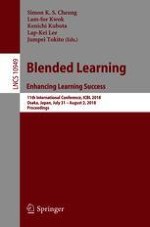2018 | OriginalPaper | Buchkapitel
A Case Study to Promote Computational Thinking: The Lab Rotation Approach
verfasst von : Jin Cai, Harrison Hao Yang, Di Gong, Jason MacLeod, Yao Jin
Erschienen in: Blended Learning. Enhancing Learning Success
Aktivieren Sie unsere intelligente Suche, um passende Fachinhalte oder Patente zu finden.
Wählen Sie Textabschnitte aus um mit Künstlicher Intelligenz passenden Patente zu finden. powered by
Markieren Sie Textabschnitte, um KI-gestützt weitere passende Inhalte zu finden. powered by
